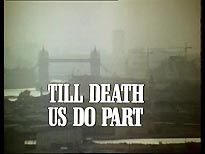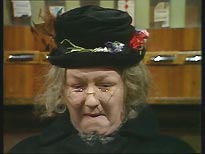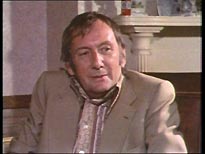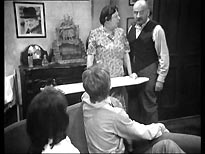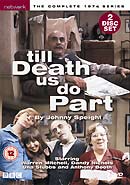
|
TILL DEATH US DO PART - THE COMPLETE 1974 SERIES Region 2 (UK) DVD - Reviewed by Ceri Laing Producer: Dennis Main Wilson Starring: Warren Mitchell, Dandy Nichols, Anthony Booth, Una Stubbs THE SERIES In January 2004 Network released the first colour series of Till Death Us Do Part, from 1972. They have now released the next series, which was broadcast two years later, as a two-disc DVD set. This series of Till Death Us Do Part – the fifth - continues in the same vein as the previous ones, with writer Johnny Speight giving an airing to the extreme right-wing views that were held by many British people in 1960s and 70s, via his lovably-monstrous creation Alf Garnett The exploration of social themes such as race, religion, politics and the royal family, made Till Death Us Do Part a controversial firebrand during the 1960s, and these topics continue to be the bedrock of the series. Alf’s views were challenged by his nemesis, “leftie” son-in-law, Mike, and his daughter, Rita, who gives support to her husband’s more moderate viewpoint, and often succeeded in deflating Alf’s pomposity. Alf’s wife Else gets the lion’s share of the punch-lines (which generally bring the house down), with her superbly-timed interjections. Most of the episodes follow the same pattern. They usually begin with a lengthy scene with the family in the sitting room of their Wapping terrace house, where Alf and Mike have a antagonistic “discussion” touching on many subjects. This is eventually followed by more routine plotting, in more traditional sitcom fashion. As ever Johnny Speight’s wonderfully-written scripts are brought to life by the fabulous cast of Warren Mitchell (The Spy Who Came in from the Cold, Jabberwocky, etc) as Alf Garnett, Dandy Nichols (The Strange World of Planet X, Ask Mr Pastry) as Else, Anthony Booth (Brannigan, Albion Market and probably now best known for being the Prime Minister’s father in law) as Mike, and Una Stubbs (Summer Holiday, Worzel Gummidge and Give Us A Clue) as Rita. Till Death Us Do Part was the undoubted success of Speight’s career, but he also wrote for Frankie Howard, Eric Sykes, Arthur Haynes and That Was The Week That Was. Mixing proceedings up are the regular appearances of Gran (Else’s mum), played by Joan Sims (best known for her Carry On roles and other film work, but her other TV work includes Sykes, Worzel Gummidge, Doctor Who and As Time Goes By). Her performance is so good she is virtually unrecognisable. Dick Emery sidekick Roy Kinnear (a versatile performer whose credits included Taste the Blood of Dracula and Willy Wonka and the Chocolate Factory) also has a recurring role. Other familiar faces include Gorden Kaye (‘Allo, ‘Allo and Porridge), Pat Coombs (another Emery stalwart, who also appeared in numerous sitcoms, including Hancock’s Half Hour, and as foil to Peggy Mount in You’re Only Young Twice) and Bar Mitzvah Boy's Adrienne Posta, who also took the role of Rita in the The Alf Garnet Saga film spin-off. The is also some end-of-series silliness with a superb turn from Spike Milligan, returning in the final episode of this 1974 series playing a Irish Pakistani. His end credit says it all really – “The role of Spike Milligan was played by Paki-Paddy”!
DISC ONE Disc one features all seven episodes from the 1974 series. They are presented in their original PAL VT format, in 4:3 format. There is one exception to this: the second episode, The Royal Wedding, was apparently lost during the great BBC Film and VT archive purges of the late 70s, and now only exists as a PAL VHS off-air recording made in Australia. Unfortunately, the Australian broadcast master of this episode was junked before its true value was realised. The episodes are more or less un-restored, with the usual amount of noise present and the odd very minor VT faults that you see in most programmes of this vintage. On the whole they don’t look bad at all. The Royal Wedding sticks out like a sore thumb, of course, and there is a note on the sleeve to explain this. It features the usual problems inherent in VHS recordings – poor definition, a high level of noise, drop out and colour instability. There is also some slight tracking waviness towards the top of the screen. The sound is very hissy and occasionally muffled. New opening titles have been spliced into the beginning of the episode to ease the transition into it, with the original end titles remaining because of unique credits. But that’s what you’d expect from such material – we should be very grateful that it’s been included at all! Not only should Network be commended for including the episode (it’s not been seen in the UK since it was originally transmitted), but it’s also presented in sequence with the other episodes on the main disc. Another label may have been tempted to include it as an extra separate from other episodes or simply ignore it. There has had to be one music substitution towards the end of episode three, Strikes and Blackouts, due to rights clearance problems. But, at least it’s been substituted and not simply removed, as it undoubtedly would have been by some companies if they had been confronted with the problem. Network has done a very good job with the fix, and it isn’t noticeable at all. Unfortunately, it looks like episode four, Party Games, is missing around twenty-four seconds of material. It’s doubtful that Network would have edited it, and it looks like they have been supplied with an edited version of the episode. This seems to be happening increasingly often, and it is extremely annoying. Disc one is a dual layer disc featuring seven thirty minute episodes, which are encoded at an average bit rate of 5.4 Mb/sec. The sound is presented in the original 1.0 mono, at 192kbps. DISC TWO All the special features are contained on the second disc, and total seventy-four minutes. They are: Johnny Speight – A Profile, a Light Night Line-Up special from 1972; the only surviving extract from the 1965 Comedy Playhouse pilot; the first ever episode, Arguments, Arguments, from 1966; a sketch from the 1972 Royal Variety Performance and a PDF (accessible via DVD-ROM) of an original script. Johnny Speight – A Profile is a half-hour interview, which features the writer talking about his early life, his time in the army, and about becoming a comedy scriptwriter. He also discusses the complaints the programme had received during it’s original 1965-68 run (the profile was broadcast in conjunction with the return of the programme in 1972, in colour, four years after the last black and white series*), and the social themes within his writing for the programme. It’s a very interesting piece, peppered with film clips of period East End life to support his early reminiscences, and clips from telerecordings of some of the black and white episodes (though one of the episode clips is from original VT!). The interview is shot on film around his large house, which he owned as the result of the programme’s success, and you also see him driving his Rolls Royce. There are brief inserts from Eric Sykes, highlighting his views on Speight’s writing, and veteran radio and TV producer Dennis Main Wilson (the then producer/director of Till Death Us Do Part), discussing the character of Alf Garnett. George Melly also featured in the profile (as testified by a credit in the end titles), but unfortunately he never got back to Network with clearance for his material in time for the pressing, so it had to be excised. The entire programme is on film (apart from the brief aforementioned VT clip) and is un-restored. As film was generally not treated very well in television at the time, it looks quite battered in places. There is a lot of dirt and the odd drop-out. A couple of the telerecording inserts exhibit some sloppy edit faults, which, again, are typical of the period. Next up is the extract from the Comedy Playhouse pilot, which runs to around two minutes in length, and features Gretchen Franklin (who had a string of minor roles, including Hazel and John Mills’ Quatermass, before eventually finding fame as Ethel in Eastenders) as Else instead of Dandy Nichols. The extract survives as it was featured in an edition of Light Night Line-up from 1966. It exists as a 16mm telerecording, which has undergone some restoration and the VidFIRE process, which returns telerecordings to their original video look. The process was previously utilised by Network for an episode that was included as an extra on their Public Eye – The Complete 1969 Series release. Unfortunately, the poor quality of the extract – it’s very washed out, with poor definition - somewhat undermines the process, so it isn’t as effective as it has been elsewhere. Following this is the first ever episode, Arguments, Arguments, which shows the nascent characters, before they fully found their feet. But, in terms of Speight’s writing, and what he was trying to achieve, it’s all there: it’s no wonder the programme made such an impact on 1960s Britain! The episode also exists as a 16mm telerecording, which has also undergone some restoration and the VidFIRE process. Whilst not the best print in the world, it’s much better quality than the Comedy Playhouse extract, and shows the VidFIRE process off to great effect, particularly in the well-lit shots. However, a shortcoming of the VidFIRE process is demonstrated here: it sometimes creates artefacts on scenes featuring quick movement (without exhaustive fine-tuning, the process cannot cope with this). They are present here, but only in a minimal way. There is also a break in the film print around twenty-five minutes in, which has been repaired as best as could be, within the restrictions of time and budget. Next is the The Royal Variety Performance sketch, from 1972. This a very funny fourteen-minute piece, with the four leads watching the The Royal Variety Performance on the TV in the usual sitting room set. This presented in its original PAL VT format without any restoration, so it exhibits the usual faults and tape noise. The sketch is featured in its entirety, but for presentation purposes on DVD it’s been edited into a package including the opening title card for The Royal Variety Performance and appropriate credits taken from the end titles. It’s hard to imagine where this sketch might have been seen in its entirety, if Network hadn’t licensed it for the DVD, so we should be very grateful that it’s been included. Unfortunately, all the above special features material has been presented on the disc as a single title, which is a minor problem, but a little irritating. Finally, there is a browned copy of the rehearsal script for the episode Strikes and Blackouts from this series – entitled The Power Cut on the script – presented in PDF form, and it makes engrossing reading. It’s great that Network continue to include material like this in their releases! Disc two is a single layer disc, featuring approximately seventy-four minutes of material, encoded at an average bit rate of 4.95 Mb/sec. In playback mode this is enough to make them look very acceptable, but closer examination reveals that individual frames are rather fuzzy. The sound is presented in the original 1.0 mono, at 192kbps. The main menus on each disc feature the same photo-composite image, backed with the theme music, and options to Play All or select an episode or special feature depending on the disc. The episodes themselves are accessible via two menus – with three episodes on each page – each with a still image from the episode illustrating the episode. From these pages you access the episode chapter menus. These sub-menus are silent. The Special Features menu on disk two is presented on a single page which, again, is silent. Unfortunately the discs do not feature any subtitles, so those who are deaf or hard of hearing will be disappointed.
SUMMARY Network have pulled things around for this release. Their relatively disappointing Till Death Us Do Part – The Complete 1972 Series disc paled in the shadow of their previous Sykes release. The most notable omission from Till Death Us Do Part – The Complete 1972 Series was an outtakes package, which could have been culled from the extensive studio material which exists for that series. But Network had to make the hard decision to lose all the special features planned for that release in order to speed up their release schedule. So, some of those features have now made it this 1974 Series release. (Well, presumably they were destined for the 1972 release, as both the Johnny Speight – A Profile and the 1972 The Royal Variety Performance sketch would be more appropriate on that release). However, that isn’t the issue – they, and the other fantastic special features, are included here, and they’re out in the world for anyone to enjoy rather than sitting in a dusty vault somewhere. You have to remind yourself that these are extras: not only do you get seven episodes of archive TV comedy brilliance (one of which most other labels would have simply ignored, due to it being in VHS format), you get those fantastic special features as well, and all for the princely sum of a little over a tenner online! Not bad at all. There are a couple of niggles though – the sleeve credits Joan Sims and Roy Kinnear for episode one, when they appear in episode two (bah! a minor trifle!), but more serious is the edited version of Party Night. In the stampede to get more TV product released on DVD, episodes are now increasingly being taken from edited source materials. Spotting this isn’t always easy, but we’ve come to expect better from Network. It needs to stop! Apart from these problems I really can’t fault this release. It would have been nice if a full-blown digital restoration, akin to that lavished on the episodes in the Sykes release, had been undertaken, even if that had meant adding a couple of pounds to the RRP. (The Sykes DVD really did set a high standard!) The Till Death… episodes don’t look too bad as they are, though, so the decision not to do this was probably the right one, especially if that money can be allocated to more needy future projects. The inclusion of the first ever episode hopefully indicates that Network might consider the black and white series for a full release. Whether you’re a fan of archive television or of TV comedy in general, you will probably be interested in the DVD release of this landmark British series. We are supposedly post-PC now, but in actuality it's still quite rampant, so Garnett’s bigoted views undoubtedly still has the power to offend people who don’t understand what Till Death Us Part was all about - as was the case when it was first broadcast. The bottom line, however, is that it’s still extremely funny…
With thanks to Network Video and Andrew Martin.
* Between 1968 and 1972 there were two new instalments of Till Death Us Do Part, an Up The Polls election special, and a sketch in Christmas Night with the Stars in 1971. All but five minutes of Up the Polls exists, courtesy of an off-air recording and a couple of PAL VT clips, but sadly the Christmas Night with the Stars sketch isn't known to survive.
|
||||||||||||||||


